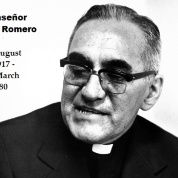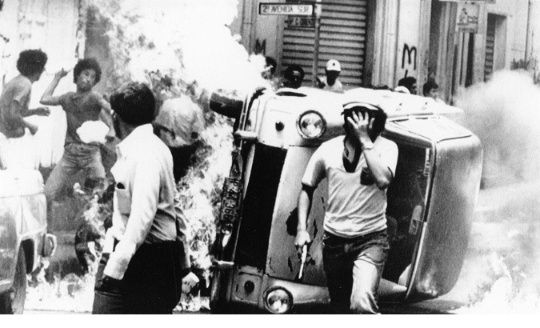Oscar Romero's death is perhaps more synonymous in modern culture for Raul Julia's portrayal of him in the movie, Romero than for the Archbishop's actual influence in El Salvador and Central America.

RELATED:
El Salvador: Supreme Electoral Tribunal Announces 2019 Presidential Elections
Certainly, those are the thoughts of his brother Gaspar, who claimed that, until the recent announcement that Oscar is to be canonized as a Saint 38 years after he was gunned down, he was largely forgotten.
Speaking to Periodistadigital.com, Gaspar lamented the fact that carrying his brother's legacy was like carrying a death sentence. "We felt alone because there was a time that no-one remembered him, (starting with the high hierarchy of the Church) we thought it was by mandate of the capital that they killed him."
The Archbishop was murdered in cold blood while delivering Mass in San Salvador, El Salvador - ironically enough, one day after calling on El Salvador's soldiers, aka the Death Squads, to cease carrying out the government's orders of massacring thousands of Salvadorans.
He was shot in the heart and fell to the floor at the foot of a giant crucifix. The gunman fled the scene in a red van, while hundreds of churchgoers crowded around the stricken Romero.

One of those caught up in the harrowing scenes was the Archbishop's personal chauffeur Pablo Morales, now residing in Surrey, B.C., Canada. Morales recalls the last days of Romero's life, and how he failed to yield his stance, despite receiving letters from the Death Squads. "Too many times I saw a letter that said, 'You want to continue to speak like this? I will kill you.' Despite this, he didn't fear for his life."
Archbishop Romero knew that the war between the government-backed Death Squads and the now-Democratically Elected leaders of El Salvador, Farabundo Marti National Liberation Front (FMLN) stemmed from U.S. propaganda to cause upheaval so they could put their choice of leader in charge of the country.
After-all, it was the U.S. who supplied the Salvadoran government with US$1-2M per day in military aid during the Carter and Reagan regimes. By 1983, the US had placed their men at the head of the Salvadoran military, further exacerbating the violence in the state.
According to Erik Ching's book, Stories of Civil War in El Salvador: A Battle of Memory (2016), the blame lies with El Salvador's economic elites, such as the U.S., who "forestalled desperately needed reforms, employed terroristic violence against the masses, and refused to negotiate a nonviolent solution to the nation's problems" (pp.25).
Furthermore, Romero had earlier, in 1980, called on the U.S. to stop supplying arms to El Salvador, arguing in an open letter to then-President Jimmy Carter that, "U.S. support would only sharpen the injustice and repression against the organizations of the people which repeatedly have been struggling to gain respect for their fundamental human rights."
Archbishop Romero's death did inspire the FMLN to step-up their efforts to gaining power in the nation, eventually leading to the overthrowing of the Death Squad’s thanks to the rise to power of Jose Napoleon Duarte – the first civilian to become president of El Salvador since 1931.
Duarte negotiated a peace settlement with the FMLN, who were then recognized as a legitimate political party in 1991.
The Salvadoran Civil War has ramifications to this day, with a recent case in Vancouver, Canada involving a Salvadoran man facing a deportation order for his past affiliation with the FMLN.
Jose Figueroa, a resident of Langley, B.C. was initially allowed into Canada as a refugee, but 13 years later the Canadian Border Services Agency (CBSA) attempted to deport him on grounds that he was “inadmissible” for his involvement with, what Canadian officials at the time, called “terrorists.”
After over two years of seeking refuge in a local Church, Jose was granted an exemption on “compassionate grounds” and allowed to stay in the country.
Figueroa cites Archbishop Romero as a “guide for Salvadorans for many years.”
In a documentary produced by students at Vancouver's Simon Fraser University, Figueroa says Romero’s words, actions, and spirit still live within Salvadorans, and, indeed, a guide within himself in discovering the errors that the CBSA made, mistaking Figueroa for a terrorist.
José Figueroa finally free - leaves sanctuary after two years. Photos/story on VMC site at: https://t.co/e2P7ECzgic pic.twitter.com/O0mnE4QYxv
— murray bush (@flux55) December 24, 2015
This Sunday, Archbishop Oscar Romero finally gets the peace he was looking for. Pope Francis will preside over the proceedings as Romero gets canonized as a Saint.
In contrast to his violent funeral that took the lives of 80 people, Romero will be celebrated with Masses, concerts, films, and lectures.
In Toronto, Canada, Romero House co-founder Jesuit Fr. Jack Costello will be screening the celebration to thousands of Salvadorans, who were caught up in the violence, and now reside in the city.
"[Romero embodies] That sense of liberating people to go beyond fear in a situation that generated fear – this is remarkable and always sacred,” Costello told The Catholic Register.
“He has been a patron of remarkable power for us,” Costello continues. “He poured his life out on the ordinary people.”